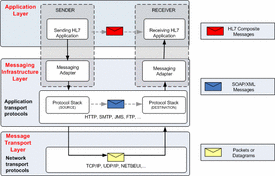This wiki has undergone a migration to Confluence found Here
Sender
Jump to navigation
Jump to search
A Sender in the context of HL7 embeds the sending HL7 Application and the Messaging Adapter responsible for Messaging Protocol configuration. A Sender implements business rules according to the HL7 Trigger Event and Interaction definition, and prepares the HL7 message for the delivery facilitated by the Messaging Protocol in the Messaging Infrastructure Layer.
Notes
- Question: Why do we embed Messaging Adapter in the concepts of the Sender and Receiver as well?
- Answer: The reason why we have included the Messaging Adapter to the Sender and Receiver is very simple - without the Messaging Adapter the HL7 Application, which is by definition able to produce and consume HL7 message (including object representation and serialization using the ITS) is not able to send the message anywhere, so no point of calling something "a Sender" where there's no sending or receiving associated to it.
- Question: If I want to identify and address HL7 Senders and HL7 Receivers, how do I do that?
- Answer: The HL7 Sender and HL7 Receiver have the same identification as the HL7 Application contained in specific scenarion. I.e. there's one to one mapping of HL7 application and HL7 Sender or Receiver. This identification is contained in Device.id class, which is never the identification of the Messaging Adapter (as the second concept in the Sender or Receiver)
--Miroslav Koncar 06:10, 2 May 2007 (CDT)
